
With the loss of jobs and income since the pandemic began, it has become more important than ever to be careful how we spend our money. Thoughtful spending is a way to live on less. If we are careful and dedicated to budgeting and carrying out our spending plan, we can still enjoy things without the financial stress. Depending on our current financial situations, we can move to an essentials-only budget or one that allows us to save for emergencies, pay off debt, and prepare income for our future retirement. Here are some ways to carry out these plans and save money.
Meal Planning and Prep

Many of us have become used to dining out or doing takeout multiple times per week. While convenient, the cost adds up. The average commercially-prepared meal costs around $13. The average meal prepared at home costs around $4 for groceries – a $9 savings per person per meal. So, a $13 restaurant meal is about 325% more expensive than a $4 meal you prepare yourself. Meal planning is a great way to make ends meet by cutting down on our food bills, avoiding food waste, and freeing up our time during the week to do other things as meals are already prepped and ready to go. It allows us to be prepared for those nights when we end up getting home late or when the family is all eating at different time schedules. It is also a healthier way to eat. Not only do we know exactly what ingredients are in our meals, but we can create portion control and better gauge how much we are actually eating. Having the meal prepped avoids coming home hungry with our blood sugars low and grabbing unhealthy foods or whatever we can grab to eat in the easiest, fastest way. There is nothing as satisfying as coming home and knowing there is something delicious and healthy ready for dinner.
Possessions versus Experiences

Many people have learned to put too much value into possessions and undervalue experiences and time spent with loved ones. Buying lots of new things can be exciting and bring us that temporary thrill of having something new, but this fades quickly, and then we need to buy another thing to recreate those feel-good endorphins. According to research, experiences result in longer-lasting happiness than material possessions. Over time, people’s satisfaction with the things they buy decreases, whereas their satisfaction with experiences over time increases. So why not save money on purchasing things and look to planning experiences instead. It can be as simple as taking a walk along a trail with beautiful scenery, a Zoom cocktail party with good friends, or a movie or game night together with our families. These experiences cost next to nothing. Spending money doesn’t necessarily equal special.
The Barter System
We have been brainwashed into believing that if something isn’t new, it’s not good. Our society is creating garbage at an alarming rate. A World Bank report projected that the amount of solid waste generated globally will nearly double by the year 2025, going from 3.5 million tons to over 6 million tons per day. We are destroying our environment with garbage. One way to help combat this problem and save money at the same time is to consider the barter system. By making connections with friend and family, we can lend things to each other, pass down toys and clothes, and work together when our community needs something. There are even dedicated websites, such as www.thredup.com, that resell clothing for you. By reusing things and sharing, we can reduce the amount of garbage we create that ends up in our landfills. Purging our closets of things we don’t wear and sharing them with others is a great way to expand our wardrobe without spending a dime. It also opens us up to trying new styles and outfits we might not have tried if we had to buy them. Children’s clothes are costly, and with the speed they outgrow things, it makes sense to share and barter them with other families. Little Billy won’t fit in those snow boots by next winter, so give them a new home with your neighbor’s boy. If a person in your community needs help with a project, consider getting together (once it is safe to do so) and helping paint or replace something. If you have a lot of time, you might want to consider looking into your local Habitat for Humanity organization at www.habitat.org. A lot of money will be saved by avoiding hiring professional workers and some fun and rewarding times can be had helping each other. Often, local Boy Scout and Girl Scout troops need projects for merit badges. It is also good to know that this help will be reciprocated when it is our turn.
Once we have made it through this pandemic and hopefully our income has returned, let’s not forget these methods of saving money. Now that we have taken better control of our finances and learned to live differently, we have the tools to avoid living paycheck to paycheck. With proper budgeting and saving, we can create a financial buffer that will ease our worries, make life less stressful, improve our environment, and create a brighter economic future. While it is important to support local businesses, we need to do so frugally. It’s a win-win situation.


